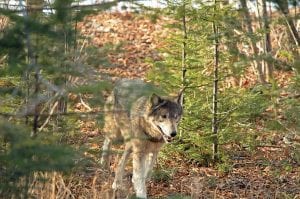An early season wolf hunt begins on the same day as deer rifle season, Saturday, November 3. The Minnesota wolf population was estimated at fewer than 750 animals in the 1950s. Minnesota’s 3,000 wolves are now the largest population in the lower 48 states. When wolves in Minnesota were removed from the federal threatened and endangered species list in January, wolf management became the responsibility of state and tribal authorities. As required by the Endangered Species Act, the U.S. Fish and Wildlife Service will monitor wolves in Minnesota for five years after delisting to ensure that recovery continues.

The first-ever wolf hunt begins Saturday, November 3 and the Minnesota Department of Natural Resources (DNR) reminds hunters that Chippewa tribal lands are closed to wolf hunting. All Chippewa bands have declared tribal lands to be off-limits to wolf hunting and trapping for the harvest seasons that start this Saturday.
Most Minnesota Chippewa reservation boundaries encompass tribal, public and private lands. Tribal lands are not considered public the way state and county forest lands are considered public. As such, they are subject to tribal regulation. The wolf hunting ban only applies to tribal lands, not other private lands or public lands that are otherwise open to hunting.
Anyone hunting wolves within a reservation boundary will need to ensure they are on public or private land open to hunting when the season starts this coming Saturday. Not all tribal lands are posted. The best source for this information is county plat maps, generally available at county courthouses.
“The bands have the authority to control or ban wolf hunting on the land they own or that is in federal trust status,” said Jim Konrad, DNR enforcement chief. “The Chippewa will be enforcing the wolf hunting ban on their tribal lands.”
The affected Chippewa reservations include the Grand Portage, Red Lake, White Earth, Bois Forte, Leech Lake, Fond du Lac and Mille Lacs reservations.
For more information on the wolf and deer hunting seasons, visit www.mndnr.gov/ hunting/wolf.


Loading Comments